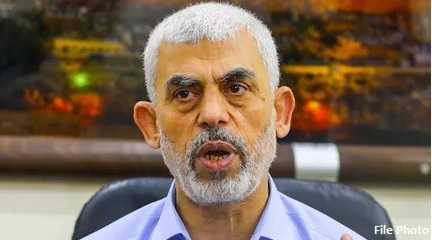
LONDON, Dec 1 (Reuters) - Last year, Yahya Sinwar told a rally in Gaza that Hamas would deploy fighters and rockets in a fierce strike on Israel, the nation that imprisoned him for 23 years before he was freed and rose to a leadership role in the militant group.
The speech by Hamas' leader in Gaza to thousands of cheering supporters bore the hallmarks of crowd-pleasing hyperbole. Less than a year later, Israel discovered it was no idle threat, when Hamas fighters broke through Gaza's fence, killing around 1,200 people and taking more than 200 hostage.
"We will come to you, God willing, in a roaring flood. We will come to you with endless rockets, we will come to you in a limitless flood of soldiers, we will come to you with millions of our people, like the repeating tide," he said during his Dec. 14 address.
By the time of the speech, Sinwar and the militant Islamists' military leader Mohammed Deif had already hatched secret plans for the Oct. 7 assault, the deadliest day in Israel's 75-year history. In response, Israel has bombarded and invaded Gaza, killing more than 15,000 Palestinians.
Heard in hindsight, Sinwar's words carry the foreboding of what was to come, an attack Hamas dubbed the "flood of Al-Aqsa," a reference to the mosque in Jerusalem that is one of Islam's holiest shrines and stands on a place revered by Jews as Temple Mount. Al-Aqsa has been subject to repeated Israeli raids.
Sinwar is leading negotiations for prisoner-hostage swaps and directing military operations along with Deif and another commander, possibly from bunkers beneath Gaza, three Hamas sources have told Reuters.
A senior Israeli security official told reporters this week Sinwar had wielded influence over talks mediated by Qatar that led to the ceasefire that ended on Friday after the release of more than 200 Palestinian prisoners by Israel in return for dozens of Israeli hostages held in Gaza.
In the days after the Oct. 7 attacks, Sinwar was seen by some of the Israeli hostages in the tunnels, freed hostages have said. Hamas and Israeli officials have not publicly commented on the reported sighting.
The question of hostages and prisoner swaps is deeply personal for Sinwar, who spent half his adult life behind bars, and has vowed to free all Palestinian prisoners held in Israel.
In his only statement since the attacks, he called on prison care associations to prepare the names of Palestinians jailed in Israel, suggesting they would all be brought home.
He was himself one of 1,027 Palestinians released from Israeli prisons in a swap for a single Israeli soldier held in Gaza in 2011.
"I call on the resistance to pledge to free the remaining prisoners. This must turn immediately to a practical plan," he said at a huge homecoming rally in Gaza City after his release.
"DEAD MAN WALKING"
Born in the Khan Younis refugee camp, Sinwar, 61, was elected as Hamas' leader in Gaza in 2017. Since Oct. 7, Israel has considered him and other leaders to be "living on borrowed time," Defense Minister Yoav Gallant said last week
Israel is unlikely to end the war before Sinwar is dead or captured, officials in the region have said.
Sinwar rose to prominence as a ruthless enforcer, the head of the Al-Majd security apparatus which tracked, killed and punished Palestinians accused of collaborating with Israel’s secret service before he was jailed.
Both Hamas leaders and Israeli officials who know Sinwar agree he is devoted to the militant movement to an extraordinary level.
One Hamas figure based in Lebanon described him as "puritanical...with an amazing ability of endurance."
Michael Koubi, a former Shin Bet official who interrogated Sinwar for 180 hours in prison, said he clearly stood out for his ability to intimidate and command. Koubi once asked the militant, then aged 28 or 29, why he was not already married.
"He told me Hamas is my wife, Hamas is my child. Hamas for me is everything."
Sinwar had been arrested in 1988 and sentenced to consecutive life terms accused of planning the abduction and murder of two Israeli soldiers and the murder of four Palestinians.
In jail, his hard line against collaborators continued, Israelis who dealt with him have said.
At time, "he did not have Jewish blood on his hands, he had Palestinian blood on his hands," Yuval Bitton, previously head of the Israel Prison Service's intelligence division, told Channel 12 TV in October.
Bitton, a dentist who treated Sinwar, said Israeli medics removed a tumour in Sinwar's brain in 2004. "We saved his life and this is his thanks," said Bitton, whose nephew is among the hostages in Gaza.
Koubi described Sinwar as being devoted to the destruction of Israel and to killing Jews. The senior Israeli official described him as a "psychopath", adding that "I don't think the way he grasps reality is similar to more rational and pragmatic terrorists".
Bitton added that the Hamas leader was willing to allow huge suffering for a cause and had once in prison led 1,600 prisoners to the brink of a mass hunger strike until death if needed in protest at the treatment of two men in isolation.
"He was ready to pay any price for the principle," he said.




